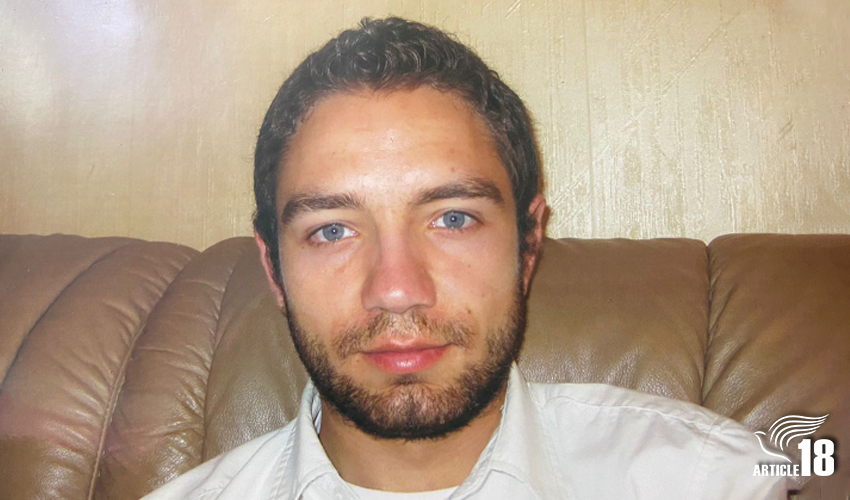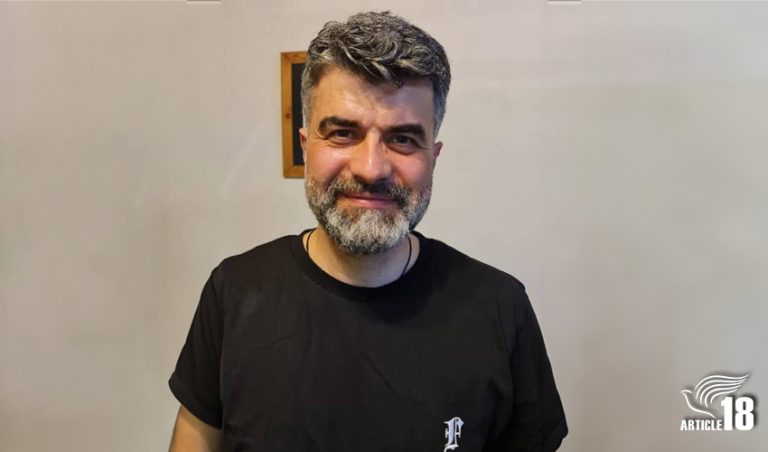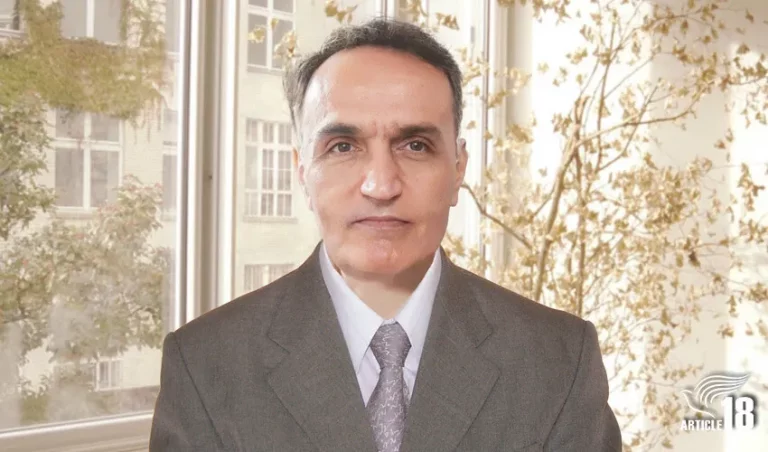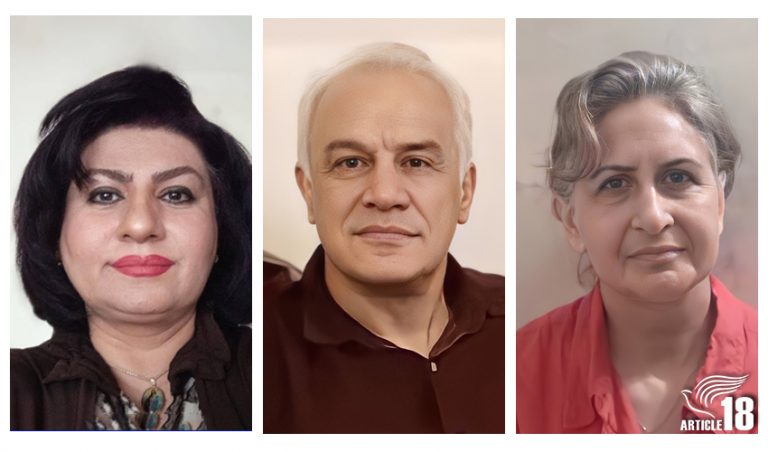
Case referenced by
Article18, USCIRF, Hostage Aid Worldwide, Asia News, Iran International, The Christian Post, Open Doors, National Catholic Register, Church in Chains, International Christian Concern, Hengaw, Premier Christian News, Human Rights Without Frontiers
Summary
Armenian citizen Hakop Gochumyan is serving a 10-year prison sentence in Evin Prison for “engaging in deviant proselytising activity that contradicts the sacred law of Islam” through alleged membership and leadership of “a network of evangelical Christianity”. He was arrested alongside his wife, an Iranian-Armenian, during a visit to Tehran in August 2023, and has remained detained ever since.
Case in full
Hakop Gochumyan was visiting Iran with his wife Elisa Shahverdian, who is Iranian-Armenian, and their two children when they were arrested on 15 August 2023 in Pardis, just outside Tehran.
The couple and their children, who were aged seven and 10, were having dinner at a friend’s home, when a dozen plainclothes agents of the Ministry of Intelligence raided the property.
The agents confiscated personal belongings, including some Christian books, and then took the Gochumyan family back to Elisa’s grandmother’s house, where they had been staying for the summer holidays.
The agents searched this property as well, before taking Hakop and Elisa away to Evin Prison, leaving their children in the custody of an aunt.
Hakop and Elisa were then placed in solitary confinement in the notorious Ward 209 of Evin Prison, which is under the control of the Ministry of Intelligence, and subjected to intense psychological torture and back-to-back interrogation sessions, each lasting between two to five hours.
Neither Hakop nor Elisa were informed of any official charges against them, in violation of Article 14 of the International Covenant on Civil and Political Rights, which Iran has ratified without reservation.
After over two months in detention, Elisa was released on bail equivalent to $40,000 on 19 October 2023, after which she returned to Armenia to be reunited with her children, who had returned home a month earlier with a relative.
Elisa’s bail had initially been set at $100,000, but her family protested that they could not afford the amount, and it was reduced by half.
Speaking to Article18, Elisa said the intelligence agents had accused her of engaging in “illegal Christian activities”, but she said she didn’t know where the accusation stemmed from and that she and her husband had done nothing illegal, nor even engaged in any Christian activities during their visit to Iran.
Elisa is the daughter of a well-known Iranian-Armenian pastor, Rafi Shahverdian, who passed away earlier in 2023, having led a church in the Armenian capital, Yerevan, since leaving Iran 30 years prior.
Elisa recorded an emotional video message in support of her husband just before Christmas 2023, saying her time in Evin Prison were “the hardest days of my life”.
“I still don’t know why they detained us,” Elisa said. “We are Christians and we did nothing illegal.
“Christmas is near and our children ask me: ‘When is daddy coming home?’ I don’t know how to answer them.”
In January 2024, Hakop was informed that he would face a court hearing on 7 January at Branch 26 of the Tehran Revolutionary Court on charges of “propaganda against the state through the promotion of Christianity”. However, the hearing was postponed.
But in February 2024, Hakop was sentenced to 10 years in prison for “engaging in deviant proselytising activity that contradicts the sacred law of Islam” through alleged membership and leadership of “a network of evangelical Christianity”.
Hakop’s sentence was pronounced by the increasingly notorious judge of Branch 26 of the Revolutionary Court of Tehran, Iman Afshari, in a case that involved nine others.
Four, including Hakop, received 10-year sentences; one received a two-year sentence; five were banned from leaving Iran and from living in Tehran and its neighbouring provinces for two years; and all 10 were fined a total of 500 million tomans (around $8,000) and deprived of rights such as membership of political or social groups.
Many personal belongings were also confiscated, including cash, digital devices and even, unusually, some properties.
However, according to an informed source, the conviction was based only on his possession of seven Persian-language New Testaments and visiting two Armenian churches and a Persian-language house-church while on holiday in Iran.
Article 160 of Iran’s Islamic Penal Code allows for judges to use their “personal intuition” when evidence is lacking, and Hakop’s lawyer argued that the judge in this case had been forced to use this provision, having found no other evidence against his client.
In June 2024, Hakop was informed that his appeal had failed.
Recommendations
Article18 requests that the international community and Christians worldwide:
- Call for the immediate release of all Christians detained on charges related to the peaceful practice of their faith.
- Call for the swift application of due process in the cases of all who are detained and/or awaiting charges, trials, sentences or appeal hearings on account of their Christian faith and activities in Iran.
- Encourage Western countries to prioritise human rights in negotiations with Iran, especially freedom of religion or belief, and urge the government of Iran to recognise all minority-faith adherents, including converts to Christianity, as full citizens before the law, enjoying their full human rights.
- Call the international community to hold the Iranian government accountable for failing to uphold its international and constitutional commitments to protect the freedom of Christians in its territories. Closing churches, appropriating church property, arresting church leaders and threatening churchgoers are violations of freedom of religion or belief, as prescribed in Article 18 of the International Covenant on Civil and Political Rights, to which Iran is a signatory, without reservation, and therefore legally bound to uphold. Meanwhile, Article 13 of Iran’s Constitution states that Zoroastrians, Jews and Christians are recognised religious minorities, who are free to perform their religious rites and ceremonies. And Article 23 says “investigation of individuals’ beliefs is forbidden, and no-one may be molested or taken to task simply for holding a certain belief”.
Background
Iran claims to provide religious freedom to its citizens, and frequently highlights its Armenian and Assyrian Christian minorities as examples of this alleged freedom.
However, the sentencing of Hakop – as well as Iranian-Armenian pastor Anooshavan Avedian, who was sentenced to 10 years in prison in 2022 for leadership of a house-church – shows that any “freedom” comes with limitations: specifically the freedom to share one’s non-Muslim faith with others.
Article 18 of the International Covenant on Civil and Political Rights, which Iran has ratified without reservation, enshrines religious freedoms including to choose one’s own faith, to change that faith, and to share it with others.
As a signatory to the covenant, Iran is obligated to provide these freedoms but consistently fails to do so.
The late president, Ebrahim Raisi, was head of the judiciary in 2021 when, in an official response to UN experts who had highlighted the arrests of house-church members on “national security” charges, those arrested were referred to as “enemy groups” of a “Zionist cult”.
Such labelling is an attempt to distinguish Christian converts, who are not recognised by the state, from the recognised Christians of Armenian and Assyrian descent, who are provided with a degree of freedom to worship, provided they do not proselytise.
But there is no freedom whatsoever for any non-Armenian or Assyrian Iranian who wishes to practise Christianity, as they are prohibited from attending the services of Armenians and Assyrians, who are themselves prohibited from preaching in the national language of Persian – all to reduce the chance of conversions.
As a result, converts, who far outnumber the ever-shrinking populations of Armenian and Assyrian Christians, have no place to worship and therefore meet together in their homes in what have become known as house-churches.
But these house-churches, though no different to any other groups of Christians meeting together to pray and worship around the world, are outlawed and members are routinely arrested and imprisoned on “national security” charges.



0 Comments
Trackbacks/Pingbacks